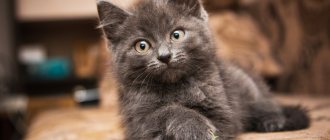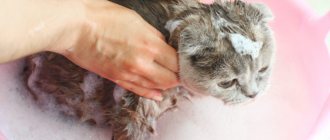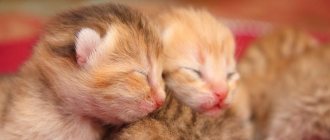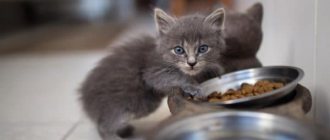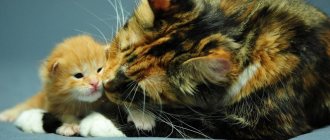When can you take a kitten from a cat: the ideal time to give away kittens
It is better to take a kitten from a cat at the age of 1.5-2 months.
There is no need to rush to remove the baby from the mother.
Veterinarians justify this figure with the following facts:
- kittens feed on mother's milk for 4-5 weeks;
- by the 7-8th week, the babies have already completely switched to adult food;
- after 1.5 months, babies actively explore the territory and are not so attached to the parent, the stress from changing homes will not be so strong.
A significant role is played by the fact that by the age of 2 months, babies have already received their first vaccination and immunity has been developed. The risks of developing dangerous diseases when moving to a new family are reduced.
The kitten begins to try adult food starting from the 3rd week of life.
Earlier weaning of kittens (at 4 weeks of age) is practiced if the litter is large or the mother cat is emaciated (sick).
In this case, the new owners of the animal have an additional burden in the form of feeding the kitten with special mixtures - cat milk substitutes. It is not recommended to replace the special formula with cow's milk.
Useful video
Once you have your pet at home, visit your nearest pet store. A flea collar is a must to prevent parasites from coming into contact with the outside world.
To help your kitten master the litter box faster, there are special liquid sprays that help with this. They have an aroma similar to cat urine, and if you spray it a little in the toilet area, the pet will smell the familiar smell and will go there when needed.
Take your pets to the veterinarian for a checkup. The baby may have worms or other parasites. It’s better to play it safe and introduce him to a doctor. Then you will be calmer and your pet will be healthier.
The video below explains why you should not take a kitten from its mother before 12 weeks.
How long does it take to wean a kitten, what should they do themselves?
The kitten begins to try adult food starting from the 3rd week of life. Young animals begin to eat the same food that their mother eats.
By the 7th week, all the babies' teeth have erupted and they are ready to completely give up milk from the cat's breast.
Be sure to read:
A cat drags kittens, hides them and moves them to another place: reasons, what to do, what can happen
By the time the animal moves to new owners, it has some skills that make it easier for new owners to care for it:
- The cat teaches hygiene to the offspring. Babies already know how to lick their fur and wash themselves.
- The period from 1.5 to 2 months is the right time to teach the offspring to go to the toilet in a tray. The children, following their mother, use the smell to find the place where they need to do their business. It is more difficult for a person to explain to a kitten where to go to the toilet.
- The age of 7-8 weeks corresponds to the development of a child 2-3 years old . The animal's behavior is almost no different from children's games: kids explore the territory, try everything, play noisily with their brothers and sisters.
When a baby arrives in the house, you need to prepare not only a tray, a sleeping basket and food, but also several suitable toys: a ball, a soft toy, a rubber mouse.
At what age can kittens be given away?
Many pet lovers bring them into their home at an early age. They believe that the sooner you take a kitten from its mother, the easier it will adapt to the house and get used to its owners and its inhabitants.
Of course, young fluffies are real charmers. You want to play with them, just hold them in your arms. But still, you should not take the baby away from the nursing mother at an early age.
Let's find out why and when it is better to separate them.
Features of early development of kittens
Colostrum and mother cat's milk are the basis for the development of kitten immunity. It helps the digestive system adapt to independent work, and the kitten itself to adapt to life outside the mother’s womb.
That is why kittens that are nursed by their mother in the first weeks of life are stronger and more protected than their artificial counterparts.
Breast milk allows the cubs to gain weight well, move actively, leave the nest and give free rein to their curiosity.
It is generally accepted that only by the 12th week can babies leave their mother cat and painlessly get used to life with their owner. It is at this age that the maternal immunity given to the offspring weakens and declines. At the same time, independent protective forces develop. Artificial immunity appears after vaccinations, that is, cat cubs can already manage without their mother.
When kittens are weaned from the mother cat's breast before this age, diarrhea, respiratory tract ailments, and frequent sneezing are possible.
If children have received their first vaccination against rhinotracheitis, panleukopenia, calcivirus, this does not mean that they are already completely protected from these ailments. Immunity does not develop until repeated vaccination. If a kitten is born weakened, then it is given the first vaccination not at 12, but at 16 weeks.
This automatically means that he should be separated from his mother later. A sudden change in diet can also negatively affect the baby’s body, which is manifested by diarrhea.
Another feature of the early development of cat cubs is the ability to use the litter box, which babies also receive from their mother. They are happy to copy her behavior, but it is much more difficult for the owner of a kitten to train him to the toilet.
The emotional state of a young fluffy is disturbed by early separation from his mother. Even the kindest and most attentive owner cannot replace her, because he is not able to warm her, like a mother, feed her and protect her.
For her cubs, she acts as a guide to the adult world, teaches them to communicate with other animals and “speak” cat language. By depriving a young pet of such lessons, you can raise a timid, intimidated and insecure cat. Or the exact opposite may happen: he will become too aggressive.
In short, early separation from the mother and deprivation of the opportunity to “take her lessons” negatively affects the psyche and emotional state of the baby.
Why is it optimal to adopt a kitten at three months?
After 12 weeks, the cat's offspring adapt better to their new home. The kittens show curiosity rather than fear towards their owner, because they have already received their first lessons from their mother and feel self-confident.
They also managed to meet new people in the company of their mother, realized that it was safe, and did not feel fear of strangers at all.
When strangers first appear in the life of a young pet after he is separated from the cat, fear can develop for life. That is, a phobia develops.
At three months, the baby is most likely already weaned from the mother's breast. He managed to get acquainted with the food of adult cats, be it ready-made food or natural products. And the immune system of babies is already more or less formed. Character traits and habits, including taste, began to appear.
The breeder or the first owner notices all this and passes the information on to the new, permanent owner. He takes everything into account and thus facilitates the adaptation of a new family member to life in his home.
If there are already other furry inhabitants there, then it will be much easier for a fluffy to get used to them at three months of age than at one month.
How to wean a kitten from mother's milk?
At the age of 2 months, animals no longer need milk.
It is difficult to overestimate the importance of mother's milk for a kitten: with it, the baby receives not only nutrients, but also the necessary antibodies to strengthen the immune system.
But at the age of 2 months, animals no longer need milk as the only source of nutrition. They can continue to suckle a cat simply out of habit for up to six months. Usually the cat itself drives away annoying teenagers, keeping them away from the nipples.
Advice! If older kittens do not give the cat rest, tugging at her nipples, she is given a fabric blanket. It is necessary to ensure that milk does not accumulate in the nipples. If lactation is not yet completed, once a day the young animals are allowed to suck the milk from their mother.
You can make the transition to adult feeding easier for the cubs by additionally providing dairy products: yogurt with natural sourdough, without sugar and fruit additives, low-fat cottage cheese.
The main food for a baby weaned from a cat is meat: boiled beef and chicken, rabbit. You can give special canned meat for kittens.
Be sure to read:
How to distinguish a male kitten from a girl: a newborn, in the first days of life
Month one
Just like human children, little kittens have very poor vision in the first days of their lives. However, by the end of the first week, many changes occur: the first undercoat appears, the kittens make their first hesitant movements, and sometimes they can crawl 30 or even 50 cm towards their mother.
By the end of the second week, kittens are still sleeping a lot, but they are starting to have periods of wakefulness. The animals still walk very unsteadily, but they train every day. During this period, babies are not ready to switch to other foods, and therefore mother’s milk remains their only nutritional option. The number of meals decreases, but the need for milk volume increases.
Owners need to monitor the mother cat’s quality nutrition so that all her kittens have enough milk. Approximately on the 14-16th day after birth, the cat’s eyes open well. In addition, his hearing improves significantly. The animal can hear and respond to the purring of its mother and respond to her call.
At 3 weeks, kittens can already hear and see very well, in fact, the same as adults. Their weight is approximately 350-450 g, and the first milk teeth begin to appear. Their activity is increasing. About a third of the day is waking time. They try to jump and run, but their orientation in space is still quite poor and they can get lost if they are placed in an unknown place.
At 3 weeks, kittens begin to look outside their “house”, so they often fall out of the box. It is worth making sure that there are no dangerous objects nearby that could injure the baby.
At 4 weeks (1 month), cats need socialization. In order for an animal to grow up well-mannered, you need to be in constant contact with it: talk, stroke, play. During this period, cats put out their nails for the first time, trying to protect themselves from people or falling or unfamiliar objects. The animal becomes very curious and plays a lot. This is a great time to teach your baby to use the litter box.
Veterinarians strictly prohibit separating the kitten from its mother during this period. He still really needs breast milk, because it is the most balanced for this period of development. Separation from the mother causes a strong psychological shock for the animal, which in turn provokes various digestive disorders and a sharp decrease in the immune system. A one-month-old kitten, left without a mother, begins to suffer from viral diseases.
How to introduce kittens to solid food?
The process of accustoming a young body to adult food takes a couple of weeks.
As a rule, by the time the baby becomes interested in the contents of the mother's bowl, several teeth have already erupted. The kitten is offered soft cottage cheese, slightly diluted with yogurt or cat milk replacer.
At another feeding they offer meat pate. Gradually, you can replace finely ground food with small and then large pieces.
Breeders feed the cubs 2-3 times a day, taking them away from their mother to another room. The food is distributed into bowls and each kitten's face is lightly dipped into the food.
The process of accustoming a young body to adult food takes a couple of weeks.
Starting to lick his lips, the baby involuntarily eats the first portions of food. The amount of food should not be large, 1 teaspoon is enough.
So that kids don’t get scared in an unfamiliar environment, they communicate with them: they talk affectionately, pet them.
What to do if the kitten is left without a mother?
Newborn kittens must be kept warm. To imitate the warm side of their mother for them, a heating pad with hot water is placed in the box with the babies. The temperature of the heating pad should be 40 degrees.
Babies are fed from a pipette or a special nipple. Cat milk or its substitute can be purchased at a pet store or veterinary pharmacy. The mixture is heated to a “steamy” temperature (this is +38 degrees) and fed to the babies.
The problem is the frequency of feedings per day. Up to 2 weeks, the cub should eat every 3 hours. From 2 to 4 weeks, the intervals between meals are increased to 4-5 hours. From 5 weeks, kittens are fed 4 times a day.
The care system for a newborn pet looks like this:
- feeding the baby itself;
- massage the tummy and inner thighs to facilitate toileting using gentle circular movements;
- wiping with a damp cloth under the baby's tail.
In the future, artificially raised pets will not differ from ordinary kittens.
Be sure to read:
Sex barrier for cats: release forms, dosage, course of administration, indications and contraindications
